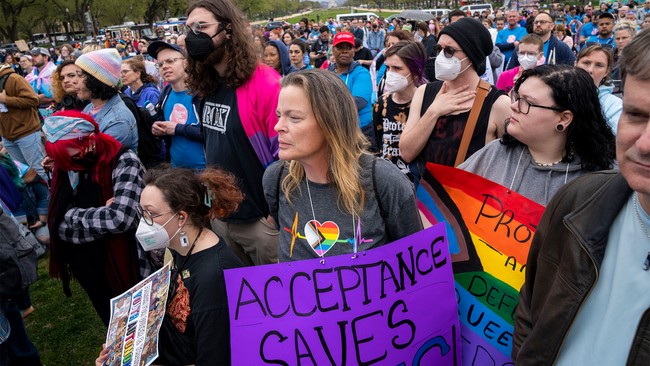
Four years ago, the doctors at the National Health Service (NHS) in Great Britain became alarmed about the treatment for children with gender dysphoria at the Gender Identity Development Services (GIDS) at the Tavistock in London. The NHS ordered a thorough study of Tavistock patients which was carried out by Dr. Hillary Cass, former president of the Royal College of Paediatrics and Child Health at NHS.
The review of 9,000 patient records revealed what many professionals have suspected for years.
“This is an area of remarkably weak evidence, and yet results of studies are exaggerated or misrepresented by people on all sides of the debate to support their viewpoint. The reality is that we have no good evidence on the long-term outcomes of interventions to manage gender-related distress,” Cass writes in the forward of the review.
It’s a devastating indictment of gender care for kids. The study debunks almost every common myth advanced by the transgender fanatics, including the idea that if kids don’t get care, they’ll kill themselves.
“Michael Biggs’ work in this field showed that over a period of ten years (between 2010 and 2020), there were four known or suspected suicides among fifteen thousand children and adolescents on the GIDS waiting list. Two of these suicides were in people who were receiving treatment, two were on the waiting list. Every suicide is a tragedy, however, these numbers align with the risks associated with other mental health challenges,” writes Stella O’Malley of Genspect, an organization that promotes “high-quality, evidence-based care for gender-nonconforming individuals all around the world.”
So much for “We want to live!”
The report recommends that no one under the age of 18 receive any kind of gender-affirming care, including hormone shots, and that “great caution” should be shown for patients under 25.
The report also takes aim at gender researchers who have been pushing the hormones on children. The way that the hormones can damage the body makes the routine dispensing of these drugs unbelievable when contemplating the harm done to children.
The report included a variety of recommendations to improve care but concluded that “for most young people, a medical pathway will not be the best way to manage their gender-related distress.” Consequently, the NHS reversed its decade-long practice of prescribing puberty-suppressing hormones (PSH) to children with gender dysphoria—“a marked incongruence between one’s experienced/expressed gender and assigned gender of at least six months duration, as manifested” in delineated criteria, according to the Diagnostic and Statistical Manual of Mental Disorders. “We have concluded that there is not enough evidence to support the safety or clinical effectiveness of PSH to make the treatment routinely available at this time,” the NHS said last month. PSH treatment will still be available for participants in clinical trials and at private clinics, although some British lawmakers are now pushing for a ban across the board.
The most important finding of the Cass Report may be that it confirms that gender dysphoria in children has been consistently — perhaps deliberately — misdiagnosed when the feelings of gender confusion could very well be related to some other comorbidity.
When it comes to alleviating gender-related distress, “for the majority of young people, a medical pathway may not be the best way to achieve this.” That conclusion will now inform the creation of new state-provided services in England. These will attempt to consider patients more holistically, acknowledging that their gender distress might be part of a picture that also includes anxiety, autism, obsessive-compulsive disorder, eating disorders, or past trauma.
The New York Post points out that “Cass slams the World Professional Association for Transgender Healthcare guidelines for transitioning children as lacking ‘developmental rigor and transparency.'” The Post also criticizes “health-care practitioners who ‘abandoned normal clinical approaches’ in order to start the process of ‘transition.'” The Post points out that “the kids should first get screened for neurological conditions, autism and mental illness.”
Related: Houston Hospital Halts Liver and Kidney Transplants After ‘Inappropriate Changes’ to Patient Records
Trans activists will probably come back by quoting results from a 2011 Dutch study that showed positive outcomes for children given puberty blockers. The Cass report debunked much of that study.
But the Cass Review highlighted some significant issues with the 2011 study. For example, some of the study participants didn’t complete questionnaires after their treatments designed to assess their improvement, potentially biasing the results towards individuals who decided to come forward with positive outcomes. Plus, all the patients saw psychiatrists or psychologists during the PSH treatment, making it difficult to isolate the positive outcomes to the effects of the drugs.
What’s more, subsequent research found that young people who experienced gender dysphoria as well as separate psychiatric issues reported no improvement in their well-being after taking PSH. Cass argued in The British Medical Journal that the early research showed success in a “small number of birth-registered males” but that the current population of people seeking gender treatment in the U.K. are largely “birth-registered”—or biological—females, and there is not sufficient evidence showing that that cohort benefits from PSH treatment. “It is unusual for us to give a potentially life-changing treatment to young people and not know what happens to them in adulthood,” Cass told BBC last week.
We all know nothing in this study is going to register with the radical trans lobby in America. They will continue to put children’s futures in danger by giving them dangerous drugs and even mutilating kids if they get the chance. It’s a tragedy that awaits a reckoning here in the United States.
I doubt that I’ll see it before I die.











